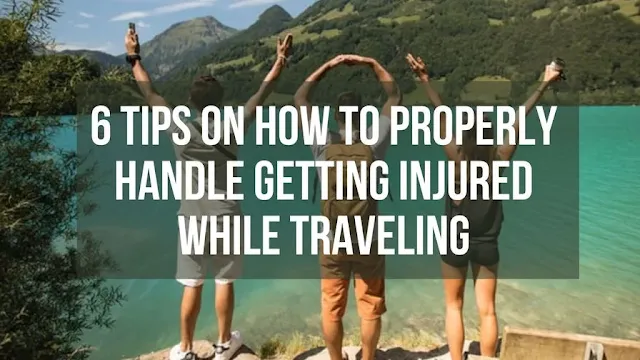Sharing with you some tips on how to handle the situation just in case you get injured when traveling.
It's always good to be prepared for the unexpected. Anywhere you go, there
are risks of injury and illness that can turn your vacation into a nightmare
if you're not ready. And while it may seem like common sense to do research
on where you're traveling before heading out, there are some things that
many people forget about or don't know about their destination until they
get there.

|
| Photo by Stephen Leonardi on Unsplash |
6 Tips On How To Properly Handle Getting Injured While Traveling
For example, most countries have different levels of medical care than what we
expect in our home country. And even if the medical facilities are high
quality, it might take hours or days for treatment to begin because of
language barriers and other logistical challenges.
This article will cover six tips on how best to handle getting injured
while traveling so that your trip doesn't become a nightmare.
1. Do Your Research Before You Go
It's a good idea to learn as much as you can about the medical facilities and
transport systems in the country you're visiting, or even if you’re just
traveling around your own.
According to
Krzak Rundio Law Group, “Safety starts with being unafraid to encourage change.” This means
tackling these issues head-on once you come face to face with them. If you are
traveling abroad, see if someone who has already been to your destination can
give information on how to safely get around and what kind of medical care is
available.
If you have a pre-existing condition, talk to your doctor about the best way
to manage it when you're traveling. And make sure that someone at home knows
where you'll be visiting and how much time you'll spend there so they know if
anything serious happens.
2. Know The Terms
When you're talking to medical staff, it's important that they know exactly
what happened. The more accurate the description of your injury is, the better
they will be able to treat you. Be specific about words like "pain,"
"stiffness," and "swelling."
You should also write down your symptoms and treatments you've received,
including the names of any medication you're taking. If possible, show them a
picture of what happened if you have one. Each country and hospital has a
slightly different system for describing injuries and treatments.
It can be helpful to write down the terms you'll need to know before you get
injured because it might be difficult to understand or describe what's wrong
with you when you're not feeling well. Knowing exactly where your injury is,
for example, can help medical professionals diagnose it properly. If you've
been given a diagnosis or treatment plan, ask to have it explained so there
are no surprises after the fact.
3. Don't Let Language Barriers Stop You From Getting Treatment
Even if most people in your
destination
speak English, most clinics and hospitals have employees who don't. This can
make it difficult to describe your problem and what you need from the medical
staff. If possible, bring someone who speaks both languages with you when you
get injured because they can help translate for the medical
professionals.

|
| Photo by Chastagner Thierry on Unsplash |
In addition, if you need a prescription written up, ask that it be given to
you in English so that there are no problems later.
4. Don't Assume The Medication You Get In The U.S. Will Be Available
In many countries, pharmacies stock common medications that might not
necessarily be available in the United States anymore. For example, some types
of antibiotics or painkillers can only be purchased with a prescription from a
doctor there because they have been found to be too addictive.
If you need a medication, ask your doctor or pharmacist to write a
prescription for it before you go so that you'll have the proper medication
when the time comes. The quality of medical care may be different from what
you might be used to in your home country.
In many cases, hospitals and clinics there don't have the same type of
equipment or supplies that would be available in an American hospital. If you
feel that your problem isn't being taken seriously or that the staff aren't
able to help you, don't be afraid to seek out additional care. Many countries
have doctors and clinics that are open long hours each day, so there are
plenty of options available.
5. Carry A First Aid Kit With You At All Times
Before you go, make sure you have all the basic supplies in your first aid
kit. This way you'll be able to clean any cuts or scrapes you receive and
monitor your temperature. If you can get antibiotics, painkillers, and
antihistamines without a prescription in your destination country, make sure
to add them to your kit.
Your local pharmacy is a great place to find first aid supplies that are easy
to pack and carry. Be sure to have enough supplies to deal with common
injuries. Here are some items you might want to
include in your kit: bandages, gauze pads, adhesive tape or medical tape, hydrogen peroxide or
alcohol wipes, Benadryl cream for insect bites and stings, acetaminophen or
ibuprofen for pain relief, and a topical antibiotic ointment.
6. Keep An Open Mind And Don't Be Afraid To Seek Additional Help
Even if you've done your best to take care of an injury, it might not get
better immediately. If the pain is getting worse or you're having trouble
functioning normally at home or during your trip, talk to a medical
professional about other options.
It doesn't do any good to wait until you get
home to deal with an injury if it could have been fixed if you had gone to see
a doctor or gotten additional treatment earlier.
Epilogue
If you're traveling to a new country, it's important that you know how to
handle getting injured while abroad. The first thing you should do is research
the medical care system in your destination so there are no surprises when an
injury occurs.
It's also crucial to have someone who speaks both languages with you at all
times because much of the staff will not speak English. Lastly, carry a first
aid kit with supplies for common injuries and pain relief medication wherever
you go you never know what can happen on vacation.
PIN THIS POST
Other similar stories:
This post may contain affiliate links, including those from Amazon Associates, which means that if you book or purchase anything through one of those links, we may earn a small commission but at no extra cost to you. All opinions are ours and we only promote products that we use.
Download a free copy of my Churches of Nueva Ecija eBook HERE!

Thank you for the tips dadi iv very helpful po specially sa mga mahilig mag travel para in case of emergency ready sila.
ReplyDeleteThank you for sharing this . Very informative and very helpful tlga ito lalo na ung madami na dn tlga ang nag travel ngayon . Importante din tlga na laging my dalang first aid kit 😍❤️
ReplyDelete